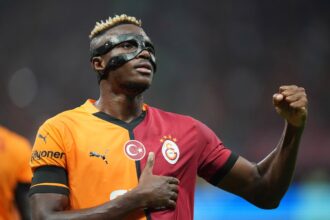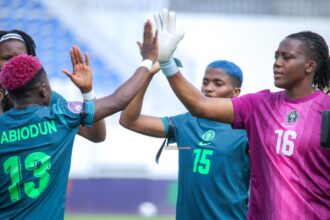Nigeria sprinter Divine Oduduru has been placed on a six-year ban after he was found guilty by the World Athletics Disciplinary Tribunal set up to investigate allegations of two potential Anti-Doping Rule Violations (ADRVs) by the Athletics Integrity Unit (AIU).
The tribunal’s ruling which was exclusively obtained by Bold Sports, showed that Oduduru was found guilty of possession (Rule 2.6 of the World Athletics Anti-Doping Rules; ADR) and/or use or attempted use of multiple Prohibited Substances (Rule 2.2 ADR).
Oduduru, in the judgement dated September 18, which was signed by Anna Bordiugova, was linked with fellow Nigerian Blessing Okagbare who was banned for 11 years for use of prohibited substance.
While Oduduru didn’t test positive for any banned substance, he was alleged to have been implicated in a WhatsApp message between Okagbare and her supplier, Eric Lira, where Okagbare mentioned “Divine” and “we” while discussing.
According to the panel, the following conversation between Okagbare and Lira took place:
BO: Good morning Eric. Any update on the stuff I asked for?
EL: Good morning love… the tb 500 with you igf1 and gonatropina is a good combination to
increase strength and oxygen levels
EL: That’s also with hgh and epo
BO: Cool. So, [how] much of each do me and divine need?
EL: I have to review the cycle to see how much you need
BO: Please eric. The ea[r]lier the better
A complaint signed by FBI Special Agent Serkes further revealed that an unnamed individual who Oduduru had asked to help move some of his belongings in his Florida apartement while away for the Tokyo 2020 Olympics on July 12, 2021, reported that he found some prohibited substances, same as linked with Okagbare.
The FBI agent’s complaint submitted to the tribunal was:
“a. On or about July 12 and 13, 2021, Individual-1, at the request of Athlete-2, who was then outside of the United States, entered a residence in the vicinity of Jacksonville, Florida (the “Residence”), where Athlete-2 had recently resided. Individual-1 intended to gather Athlete�2’s belongings and to transfer those belongings to a near-by storage facility. At the time that Individual-1 entered the Residence, Athlete-1 was abroad, training for the then-upcoming Tokyo Olympics.
b. Inside the residence, Individual-1 found and photographed packages and vials that appeared to be various performance enhancing drugs, including drugs on the Prohibited List described above. Individual-1 subsequently provided those photographs to the FBI. For example:
(i) Individual-1 provided photographs of a United States Postal Service parcel from “Eric Lira/ [redacted street address] / El Paso, TX” (the “El Paso Address”) with a particular telephone number for Lira (the “Lira Number”). The same parcel was addressed to Athlete-1 at an address other than the address of the Residence.
(ii) Individual-1 also provided photographs of the content of that parcel, which was a single box containing a drug appearing to have been manufactured by a Mexico-based pharmaceutical company. The box was labeled: “Xerendip® Somatropina,” and, in Spanish, “injectable.” From my review of publicly available sources of information regarding the content and effect of various drugs, I have learned that somatropin (or, in Spanish, “somatropina”) is a human growth hormone, which, as noted above, is among the prohibited substances on the Prohibited List.
(Subsequent to July 13, 2021, I obtained the same box of Xerendip from the storage locker into which Individual-1 moved this drug and other items, having obtained consent to enter the storage facility. Upon inspection of the box itself, I have noted that the box indicates, in Spanish, that the drug is to be administered only as prescribed by a physician (“Dosis: Lo que el médico señale.”). I also received from the same storage locker a used box of a Mexico-manufactured, injectable erythropoietin drug, Alveritin. The box, which originally contained six vials of that substance, was found containing only one remaining vial. As described in more detail below, both the photographs of these categories of drugs provided by Individual-1 and the drugs that I obtained subsequent to July 13, 2021, are drugs of the same categories discussed in the course of communications between Eric Lira, the defendant, and Athlete-1).
(iii) Individual-1 also provided a photograph of a small, clear, sealable bag containing three vials of white powder. The bag was labeled “IGF [illegible] R3.” From my experience in this case and from my conversations with other FBI agents working on separate investigations of performance enhancing substances, I know that “IGF” is an abbreviation for “insulin growth factor.” Among the substances on the Prohibited List is “Insulin-like Growth Factor-1 (IGF-1) and its analogues. (iv) Individual-1 further provided a photograph of a box of 100 hypodermic needles, insulin injection needles, and various other drugs including A) a separate box of somatropin, also from what appears to have been a Mexico- or Central American pharmaceutical company, bearing the brand name “Humatrope;” and B) a box labeled as containing a “prefilled syringe” holding 5 ml of “recombinant human erythropoistin injection.” This final drug’s box included a symbol representing that it is a prescription drug, i.e., “Rx.””
Oduduru who was represented by his lawyer, Chinedu Udora, however denied having knowledge of the prohibited substances reportedly found in his house. According to him, he had no possession of any of such in his appartement when he left for Europe to prepare for the Olympics on July 3, 2021.
He also said the person he asked to move his belongings from his appartement never mentioned finding any prohibited substance in his apartment even though they maintained phone communications. He also denied being the one mentioned in the WhatsApp chats between Okagbare and Lira, saying he was unaware of that any conversation of such took place.
Oduduru further held that through the period the conversation between Okagbare and Lira held in 2019 to 2021 when the substances were reportedly found in his apartment to February 2023 when he was provisionally suspended, he was tested numerous times and returned negative. He alleged a gang-up to implicate him.
The tribunal however dismissed his defense, finding him guilty of violating rules 2.6 and 2.2 of the World Athletics Anti-Doping Rules. He was subsequently banned for six years from February 6, 2023.
The ruling read, “The Athlete has committed ADRVs under Rules 2.6 and 2.2 ADR. The violations shall be considered together as one single first violation.
“A period of Ineligibility of six (6) years is imposed by the Panel upon the Athlete commencing on the date of the Decision. The period of Provisional Suspension imposed on the Athlete from 9 February 2023 until the date of the decision shall be credited against the total period of Ineligibility.
“The Athlete’s results from 12 July 2021 until the date that the Provisional Suspension was imposed, on 9 February 2023, shall be disqualified with all resulting consequences including the forfeiture of any titles, awards, medals, points and prize and appearance money.”

He was also ordered to pay World Athletics $3,000 “as contribution towards the legal fees and other expenses incurred in connection with these proceedings”.
© Bold Media Innovations & Creative Hub Limited. All rights reserved. If sharing, kindly credit Bold Sports as the source and include a link to the original post. Unauthorised use is prohibited.




















Nigerian athletes are too stingy and selfish